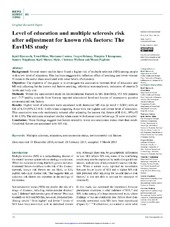Level of education and multiple sclerosis risk after adjustment for known risk factors: The EnvIMS study
Bjørnevik, Kjetil Lauvland; Riise, Trond; Cortese, Marianna; Holmøy, Trygve; Kampman, Margitta Theodora; Magalhaes, Sandra; Myhr, Kjell-Morten; Wolfson, Christina; Pugliatti, Maura
Peer reviewed, Journal article
Published version

Åpne
Permanent lenke
https://hdl.handle.net/1956/10945Utgivelsesdato
2015-05-26Metadata
Vis full innførselSamlinger
Originalversjon
https://doi.org/10.1177/1352458515579444Sammendrag
Background: Several recent studies have found a higher risk of multiple sclerosis (MS) among people with a low level of education. This has been suggested to reflect an effect of smoking and lower vitamin D status in the social class associated with lower levels of education. Objective: The objective of this paper is to investigate the association between level of education and MS risk adjusting for the known risk factors smoking, infectious mononucleosis, indicators of vitamin D levels and body size. Methods: Within the case-control study on Environmental Factors In MS (EnvIMS), 953 MS patients and 1717 healthy controls from Norway reported educational level and history of exposure to putative environmental risk factors. Results: Higher level of education were associated with decreased MS risk (p trend = 0.001) with an OR of 0.53 (95% CI 0.41–0.68) when comparing those with the highest and lowest level of education. This association was only moderately reduced after adjusting for known risk factors (OR 0.61, 95% CI 0.44–0.83). The estimates remained similar when cases with disease onset before age 28 were excluded. Conclusion: These findings suggest that factors related to lower socioeconomic status other than established risk factors are associated with MS risk.
